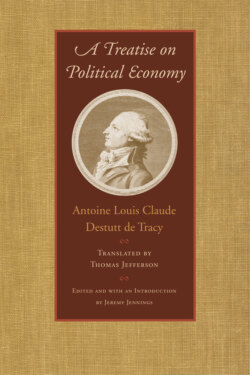Читать книгу A Treatise on Political Economy - Antoine Louis Claude Destutt De Tracy - Страница 29
На сайте Литреса книга снята с продажи.
CHAPTER VI.
ОглавлениеOf Money.
Commerce can and does exist to a certain degree without money.
The values of all those things, which have any, serve as a reciprocal measure.
The precious metals, which are one of those things, become soon their common measure, because they have many advantages for this purpose.
However they are not yet money. It is the impression of the sovereign which gives this quality to a piece of metal, in establishing its weight and its fineness.
Silver money is the only true common measure.
The proportion of gold and silver vary according to times and places.
Copper money is a false money, useful only for small change.
It is to be desired that coins had never borne other names than those of their weight; and that the arbitrary denominations, called monies of account, such as livres, sous, deniers, &c. &c. had never been used.
But when these denominations are admitted and employed in transactions, to diminish the quantity of metal to which they answer, by an alteration of the real coins, is to steal.
And it is a theft which injures even him who commits it.
A theft of greater magnitude, and still more ruinous, is the making of paper money.
It is greater, because in this money there is absolutely no real value.
It is more ruinous, because by its gradual depreciation, during all the time of its existence, it produces the effect which would be produced by an infinity of successive deteriorations of the coins.
All these iniquities are founded on the false idea that money is but a sign, while it is value and a true equivalent of that for which it is given.
Silver being a value, as every other useful thing, we should be allowed to hire it as freely as any other thing.
Exchange, properly so called, is a simple barter of one money for another.
Banking, or the proper office of a banker, consists in enabling you to receive in another city the money which you deliver him in that in which he is.
Bankers render also other services, such as discounting, lending, &c. &c.
All these bankers, exchangers, lenders, discounters, &c. &c. have a great tendency to form themselves into large companies under the pretext of rendering their services on more reasonable terms, but in fact to be paid more dearly for them.
All these privileged companies, after the emission of a great number of notes, end in obtaining authority to refuse payment at sight; and thus forcibly introduce a paper money.
